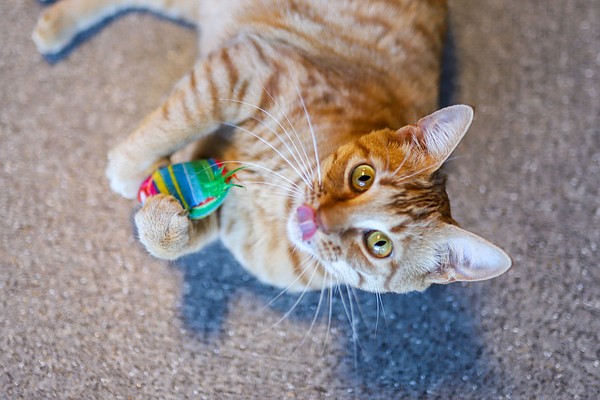PITTSBURG, Kan. – Eight beagles, including four newborns, are safe at an animal shelter in southeast Kansas after they and nearly 4,000 other dogs were rescued last month from a mass-breeding lab in Virginia, sparing them a future of painful experimentation and trial.
No longer known by their numbers – their “product numbers” are tattooed inside the adult dogs’ ears – the eight dogs now have names and, in a few weeks, will have new homes.
When the eight beagles arrived at the Pittsburg Animal Shelter on July 26, after a 16-hour, 1,075-mile journey, the workers and volunteers who had gathered to greet them broke down in tears.
“We all cried here,” said shelter manager Jasmine Kyle, “but it was a cry of joy. They’ll never have to worry about tube feeding again, they’ll never have to worrying about blood tests – none of that.
The Southeast Kansas Humane Society was one of 15 shelters across the country that initially volunteered to step in and care for malnourished and abused beagles. It is a partner shelter of the Humane Society of the United States, which led the rescue of the beagle.
“We are very proud to be able to help them,” said Kyle.
She added that during the worst of the pandemic, to prevent struggling families from abandoning their dogs, the Humane Society of the United States donated pallets of food to the southeast Kansas shelter, which in turn provided a free food pantry for area residents.
“We’re going to do our best to help them” and reciprocate, Kyle said.
The rescued beagles include two adult males, Robert, 4, and Copper, 1, and two adult females, Nellie, 7, and Daisy, 3. Five weeks ago, Daisy had a litter of four puppies: Lavender, Rose, Marigold and Tulip.
“They’re all in relatively good physical condition,” Kyle said.
The dogs will be tested next week for coccidia, which is treatable. After that, Robert, Copper and Nellie will be neutered and neutered. After a week of quarantine, these three beagles should be ready for adoption. Daisy and her puppies will be available for new homes at a later date.
“They weren’t actively tested dogs,” Kyle said. “A lot of those 4,000 beagles came from the company breeding facility,” Kyle said. “The company, for the most part, bred them to sell to other companies who used them for testing – pharmaceuticals, cosmetics, food.”
“Serious Violations”
The removal of the beagles from the breeding facility, owned by a company called Envigo, is the result of a lawsuit filed by the US Department of Justice in May, which described “serious and continuing violations of the Animal Welfare Act,” according to the complaint was filed in the U.S. District Court for the Western District of Virginia.
According to the complaint, the beagles were routinely killed rather than receiving veterinary care for minor injuries or illnesses. Nursing mothers were denied food, and the food the dogs received contained maggots, mold and feces. Over an eight-week period, 25 beagle puppies died from exposure to the cold and some were injured when attacked by other dogs in crowded conditions, the complaint states.
The Humane Society of the United States, based in Washington, DC, was tasked with the rescue operation.
“Finding partners who can make room and find homes for approximately 4,000 dogs in the summer – a time of year when animal shelters are already over capacity – will be a feat of epic proportions,” said Kitty Block. , president and CEO of the Humane Society. from the United States, in a July 18 blog post. allow these dogs to find loving homes.”
Block said in the post that the national organization will continue to work through legislative, regulatory and corporate efforts to end the use of animals in lab testing.
Kyle said she was emotional thinking about what the beagles, who are kept in a special room inside the Pittsburgh shelter, may have been through.
“When you walk in there and see these dogs and how open they are to human compassion, it breaks your heart…that they were lied to and mistreated like this,” a- she declared.
Beagles are known as one of the most gentle and child-friendly breeds, which is why they make such great pets. Unfortunately, their passive nature also makes them popular for medical experiments, Kyle said, “because they’re easy to handle, very nice and gentle, with low testosterone levels – unfortunately.”
The main reason the Pittsburgh shelter was able to take in beagles in the first place had to do with a fluke of rural nature — 90% of the dogs they care for are large breeds, Kyle said. When the call from the Humane Society of the United States came, they had several small open kennels perfectly sized for beagles.
“If (the beagles) had been bigger dogs, we couldn’t have helped,” Kyle said. However, “never in a million years would I have thought we would be singled out for something like this.”
This is the largest rescue operation the Pittsburgh shelter has ever been involved in, “but it shows how great the need was,” she said.
 Christ Yoder
Christ Yoder



